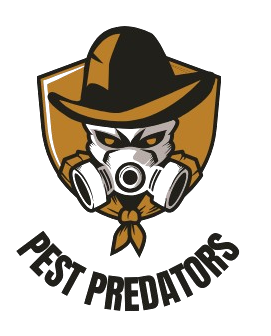When you hear "pest control," what comes to mind? For many, it's an image of someone with a spray can, dealing with a problem that’s already out of hand. But professional pest control is so much more than just a quick fix. It’s a proactive service designed to manage, get rid of, and ultimately prevent unwanted pests from taking over your home or business.
Modern pest management is all about getting to the root cause of an infestation. The goal isn't just to eliminate the pests you can see, but to implement long-term, sustainable solutions that protect your health and property for good.
What Modern Pest Control Services Actually Do
Forget the outdated idea of a lone exterminator. Today’s pest control technician is more like a ‘home doctor’. They don’t just treat the symptoms—the scurrying spiders or the line of ants—they diagnose and cure the underlying issues that let pests get in to begin with. It’s a methodical process backed by a real understanding of pest behaviour.
Think of it like this: if you keep swatting flies in your kitchen but don’t find out why they're there, you'll be swatting forever. A professional, on the other hand, will play detective. They'll look for the source—an overlooked spill, a bin that doesn't seal properly, or a small tear in a window screen. That’s the core of modern pest control: inspection, identification, and a strategic plan of action.
To give you a clearer picture, here’s a quick breakdown of what professional pest control really involves.
At a Glance: What Pest Control Services Include
| Service Component | What It Involves | Primary Goal |
|---|---|---|
| Initial Inspection | A thorough examination of the property, looking for active pests, droppings, damage, and potential entry points. | To accurately identify the pest species and determine the scale of the problem. |
| Pest Identification | Using evidence and expertise to pinpoint the exact type of pest, whether it’s a specific ant, rodent, or insect. | To ensure the correct, most effective treatment method is chosen. |
| Treatment Plan | Developing a customised strategy that may include baiting, targeted spraying, trapping, or exclusion techniques. | To eliminate the current infestation safely and efficiently. |
| Implementation | The professional application of treatments, focusing on problem areas while keeping safety a top priority. | To eradicate the pest population at all life cycle stages. |
| Prevention & Proofing | Sealing entry points, removing attractants, and offering advice on how to make the property less inviting to pests. | To stop future infestations before they can even start. |
| Follow-Up & Monitoring | Return visits to check on the effectiveness of the treatment and make adjustments if necessary. | To ensure the problem is completely resolved and provide lasting peace of mind. |
As you can see, it's a comprehensive process that goes far beyond a simple spray. Each step builds on the last to deliver a robust, lasting solution.
The Diagnostic Process
The first and most crucial step is always a thorough inspection. A trained technician isn’t just looking for the pests themselves; they’re searching for the clues they leave behind. This can be anything from droppings and nesting materials to subtle property damage and hidden entry points. By piecing these clues together, they can identify the specific intruder and get a true sense of the infestation's size.
Getting the identification right is absolutely critical because different pests need completely different solutions. For instance, the treatment for carpenter ants, which tunnel through wood, is worlds away from what you’d use for pharaoh ants, which are drawn to moisture. This precision prevents wasted time and the use of ineffective or unnecessary chemicals.
Key Insight: Effective pest control isn't about using the strongest chemical available. It's about applying the right solution in the right place, based on a deep understanding of a pest's biology and habits. This targeted approach is safer, more effective, and much kinder to the environment.
Understanding the Enemy
Once the pest is identified, a professional uses their knowledge of its life cycle and behaviour. They know where a particular species likes to nest, what it eats, and how it reproduces. This expertise allows them to hit the infestation where it hurts, interrupting the pest's life cycle at its most vulnerable point. It’s a far more permanent solution than a surface spray could ever hope to be.
This image breaks down the most common pests we find in UK homes into their main categories.
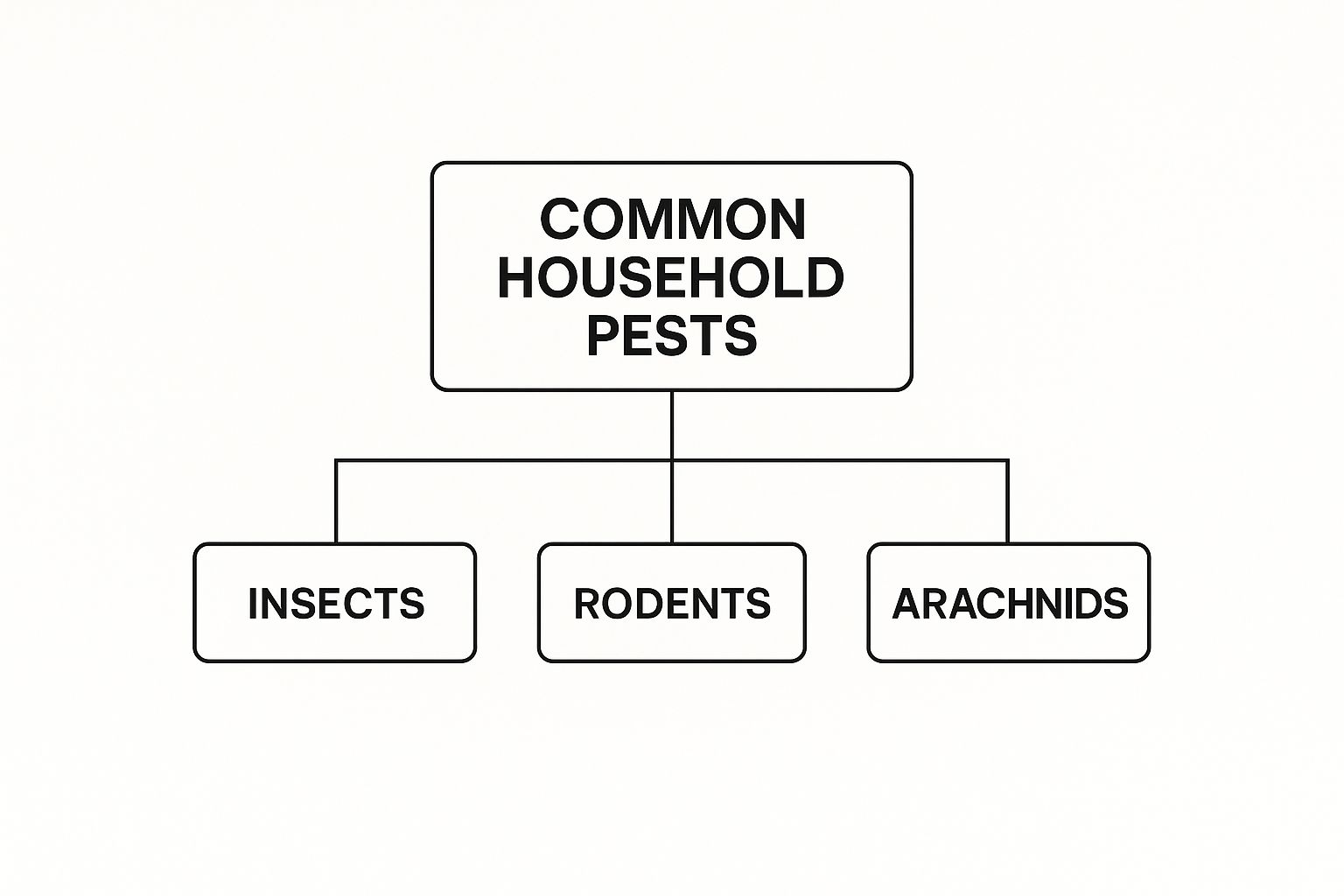
Recognising these distinct groups is the first step in creating a treatment plan that actually works, as the strategies for insects, rodents, and arachnids vary enormously. Ultimately, professional pest control is about delivering peace of mind by creating a healthy, safe environment through prevention, not just temporary fixes.
Why Are Pest Problems Getting Worse Across the UK?
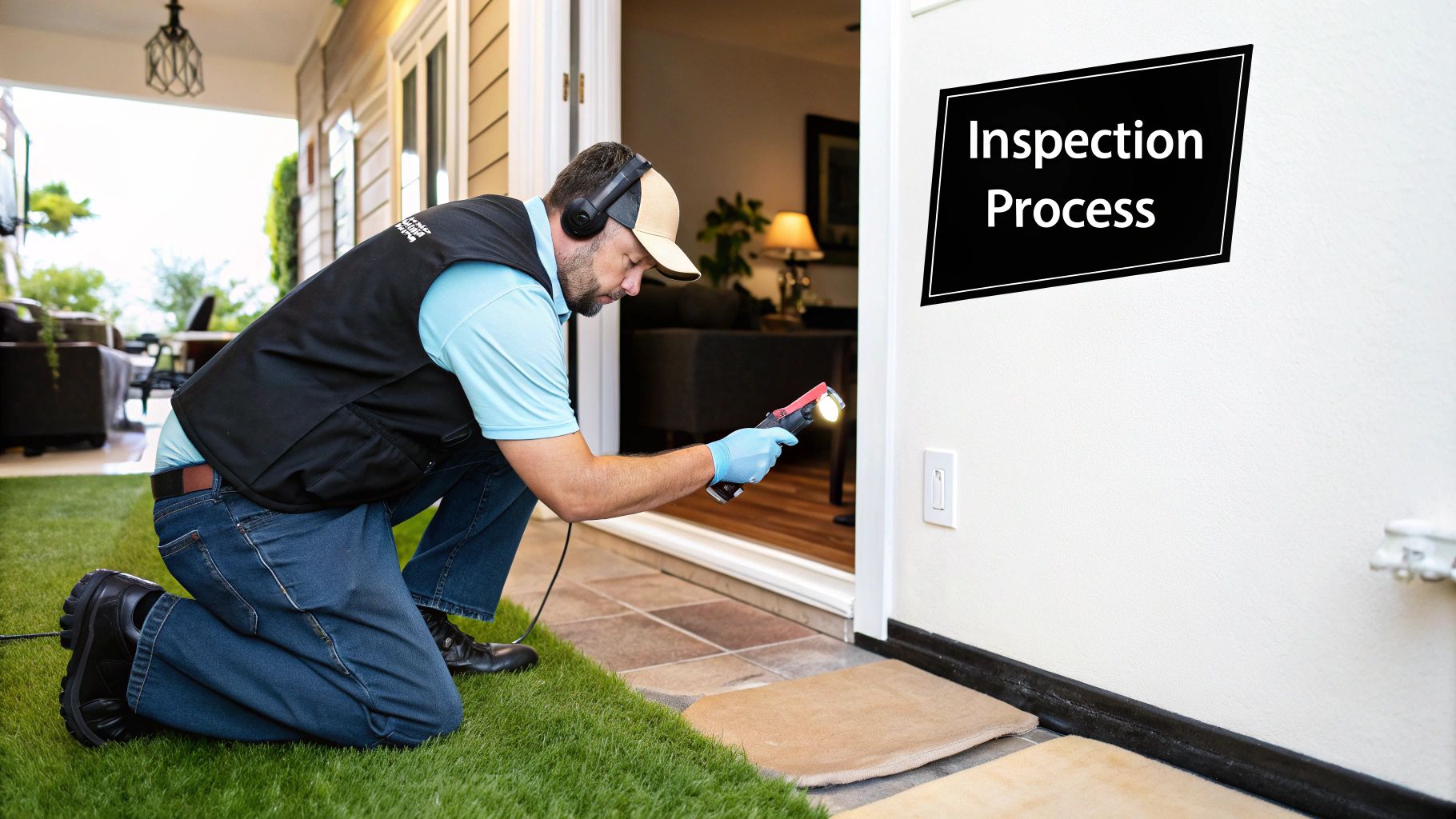
If it feels like you're seeing more pests than ever before, you're not imagining it. From brazen urban foxes tipping over bins to lines of ants marching through your kitchen, it seems our homes and businesses are under constant threat.
This isn't just a string of bad luck. It's the result of some major shifts in our environment and how we live, creating a perfect storm that helps pests thrive. Understanding what’s driving this trend makes it clear why professional pest control services are becoming less of a luxury and more of a necessity.
The Urban Squeeze
As our towns and cities grow, we're constantly building on what used to be natural habitats. This expansion pushes wildlife like rodents and foxes out of their usual territories. Where do they go? Straight into our neighbourhoods, where our homes and gardens offer everything they need to survive and multiply: food, water, and shelter.
This is made worse by the simple fact that the UK is becoming more built-up. In 2022, around 75% of Europe's population lived in urban areas, and that number is only set to climb. Densely packed buildings, endless hiding spots, and abundant waste create the ideal breeding ground for pests in both homes and businesses.
Milder Winters and Wonky Seasons
Our changing climate is another huge piece of the puzzle. Milder, shorter winters mean that pests that would normally be killed off by a hard frost or forced into hibernation are now surviving all year round.
Think about wasps. Traditionally, only the queen would make it through the winter to start a new nest in spring. Now, warmer weather allows entire colonies to survive longer, start earlier, and grow much larger. The same goes for all sorts of insects.
Here's a real-world example: Warmer temperatures allow insects like ants to stay active for more of the year. Their colonies have more time to expand and forage for food, which is why you might see them appearing earlier in spring and sticking around long into the autumn.
Our Throwaway Culture Feeds the Problem
Modern life generates a staggering amount of waste, and for pests, it's a non-stop buffet. Overflowing bins, commercial rubbish areas behind restaurants, and public litter provide a reliable food source for everything from rats and gulls to cockroaches and flies.
Even with regular collections, the sheer volume of rubbish is often too much. A single torn bin bag left out overnight is basically an open invitation to a family of rodents or foxes. This easy access to food doesn't just attract pests; it helps their populations explode.
When you combine urban growth, a warmer climate, and all this readily available food, you get a complex problem that often needs an expert to solve. Pests like bed bugs, for example, thrive in densely populated areas and can be incredibly difficult to get rid of without specialist help. If you're worried about these particular invaders, you can learn more about how to say goodbye to bed bugs with professional heat treatment.
Common Pest Treatments and How They Work
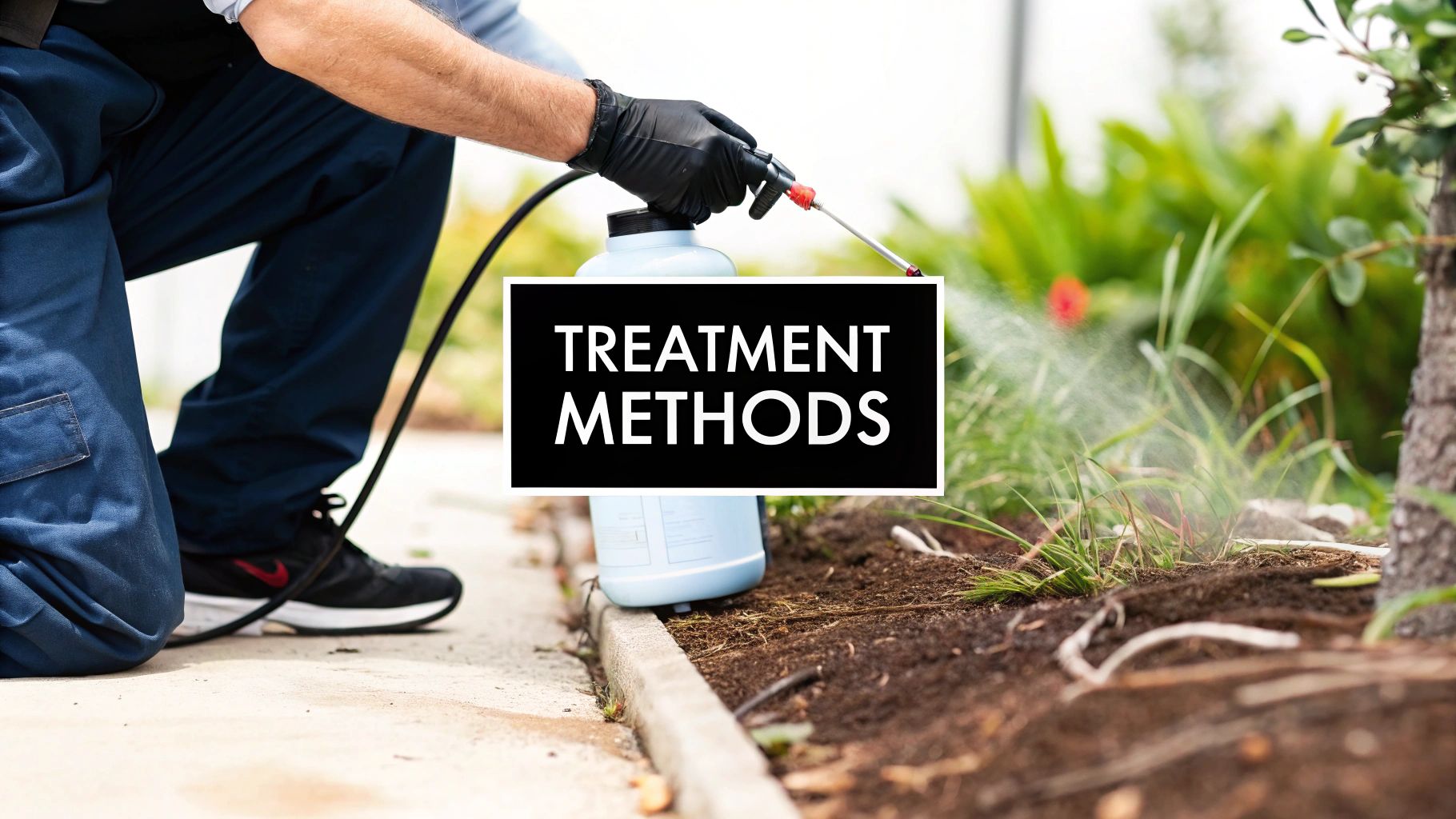
Once a pest problem has been sussed out, a professional opens their toolbox. But it’s not just a case of grabbing a single spray or trap. Modern pest control services rely on a whole range of methods, with each one carefully chosen for the specific pest and situation. Understanding these treatments helps demystify what’s actually happening when a technician arrives at your door.
The approach is always tailored to the pest you're dealing with. Think of it this way: you wouldn't use the same tool to fix a leaky pipe as you would to rewire a light switch. In the same way, the strategy for getting rid of rodents is worlds apart from the one used for insects.
Targeted Chemical Applications
When most people think of pest control, they probably picture chemical sprays. While these are certainly part of the arsenal, their application is far more precise than you might imagine. Professionals use specific formulas designed to be highly effective against a particular pest while minimising any impact on the surrounding environment.
These treatments can include:
- Insecticides: These are compounds used to bring insect populations under control. They come in various forms, like liquids, dusts, aerosols, and baits, each suited to different scenarios.
- Rodenticides: These are specially formulated baits used to control mice and rats. Crucially, they are always placed in secure, tamper-proof bait stations to prevent children, pets, and other wildlife from accessing them.
A key part of a professional service is the safe and strategic use of these products. For example, instead of a broad, unfocused spray, a technician might use a gel bait for cockroaches. This gel is applied with surgical precision directly into the cracks and crevices where roaches hide, targeting the infestation right at the source and limiting exposure.
Physical and Mechanical Solutions
Often, the best solution involves no chemicals at all. Physical controls are all about either physically removing pests or, even better, blocking them from getting in and setting up camp in the first place. This approach focuses on changing the environment to make it unwelcoming for pests.
These methods are incredibly effective and form the backbone of any good long-term pest management strategy. They directly tackle the "how" and "where" of an infestation.
Key Insight: A truly effective pest management plan is built on a foundation of physical prevention. Sealing an entry point is a permanent fix, whereas a chemical treatment might only offer a temporary break if the root cause isn't addressed.
Common physical controls include:
- Advanced Trapping: Modern traps for rodents and insects are far more sophisticated and effective than what you'd find in a DIY shop. They are placed strategically along the routes pests travel, which were identified during the initial inspection.
- Exclusion Work: This is just a professional way of saying "pest-proofing a building". It involves finding and sealing all potential entry points, from tiny cracks in the foundation to gaps around pipes and vents.
- Habitat Modification: This could be as simple as trimming back tree branches that are touching your roof, or installing bird netting on a commercial building to stop pigeons from roosting and making a mess.
The Role of Biological Controls
A more natural approach involves using a pest's own enemies against it. Biological control is the practice of using living organisms—like predators, parasites, or pathogens—to keep a pest population down. While it’s less common in typical residential homes, it's a powerful tool in agriculture and other specialised environments.
For instance, introducing specific types of wasps that prey on aphids can manage an infestation in a greenhouse without any need for chemicals. Similarly, certain bacteria can be used to control mosquito larvae in ponds or water butts.
Of course, handling stinging insects like wasps and bees requires expert knowledge to ensure everyone's safety and get the job done right. If you're facing that kind of issue, it's vital to understand when to call the pros for wasps and bees.
Here is the rewritten section, crafted to sound like an experienced human expert, following all the provided guidelines and examples.
The Shift to Eco-Friendly Pest Management
Let’s be honest, effective pest control doesn’t have to mean declaring chemical warfare on your home. There’s a huge shift happening in the professional pest control world, and it’s being led by homeowners just like you—people who want solutions that actually work, but are also kinder to the environment, kids, and pets. This smarter philosophy is called Integrated Pest Management (IPM).
Think of IPM less as a single treatment and more as a multi-layered defence system for your property. It’s a thoughtful, intelligent approach that focuses on prevention and long-term results, rather than just reaching for a quick chemical fix. It’s a fundamental change from simply spraying what you see to proactively managing your environment.
The IPM Pyramid: A Tiered Approach
Imagine a pyramid. The base—the largest and most important part—is all about prevention. As you move up, the actions get more direct and targeted, with the very tip-top being the use of chemicals, saved only as a last resort.
This tiered system ensures we always start with the least invasive methods. It’s a progressive strategy that solves pest problems with minimal impact on everything else.
- Prevention and Proofing: This is the foundation. It’s the commonsense stuff that makes a huge difference: sealing cracks in walls, fixing leaky pipes, managing rubbish properly, and getting rid of potential food sources. The goal is to make your property an unwelcome and hard-to-reach place for pests in the first place.
- Physical and Mechanical Controls: If pests do manage to get inside, the next step is to physically remove them. This could involve using advanced traps, sticky monitors, or even specialised vacuums to deal with the problem directly without resorting to chemicals.
- Targeted Low-Toxicity Treatments: Only when the above methods aren't enough will a professional even consider using chemicals. And even then, an IPM approach means using low-toxicity, biodegradable products applied with surgical precision. We target only the specific pest, protecting you, your family, and your pets.
Key Takeaway: Integrated Pest Management is all about solving the problem at its source. It asks, "Why is this pest here?" and fixes the root cause, rather than just masking the symptoms of an infestation.
Why This Shift Matters
The move toward greener solutions isn't just a fleeting trend; it’s a response to a real-world demand for safer, more responsible pest control. Homeowners are rightly more conscious than ever about the products being used in and around their living spaces. This, combined with tighter regulations on certain pesticides, has pushed the entire industry to get smarter and innovate.
You can see this evolution in the market’s growth. The UK pest control market was valued at around USD 1,248.29 million in 2025 and is projected to grow by 5.6% each year. This boom is largely driven by the switch to environmentally friendly methods as people become more aware of both the health risks from pests and the benefits of sustainable solutions. You can dive deeper into these numbers in this detailed pest control market report.
Ultimately, eco-friendly pest management gives you a solution that works with your environment, not against it. It offers peace of mind, ensuring your home is safe from both pests and unnecessary chemicals. This responsible strategy is the future of professional pest control services, delivering effective results you can feel good about.
How to Choose the Right Pest Control Company
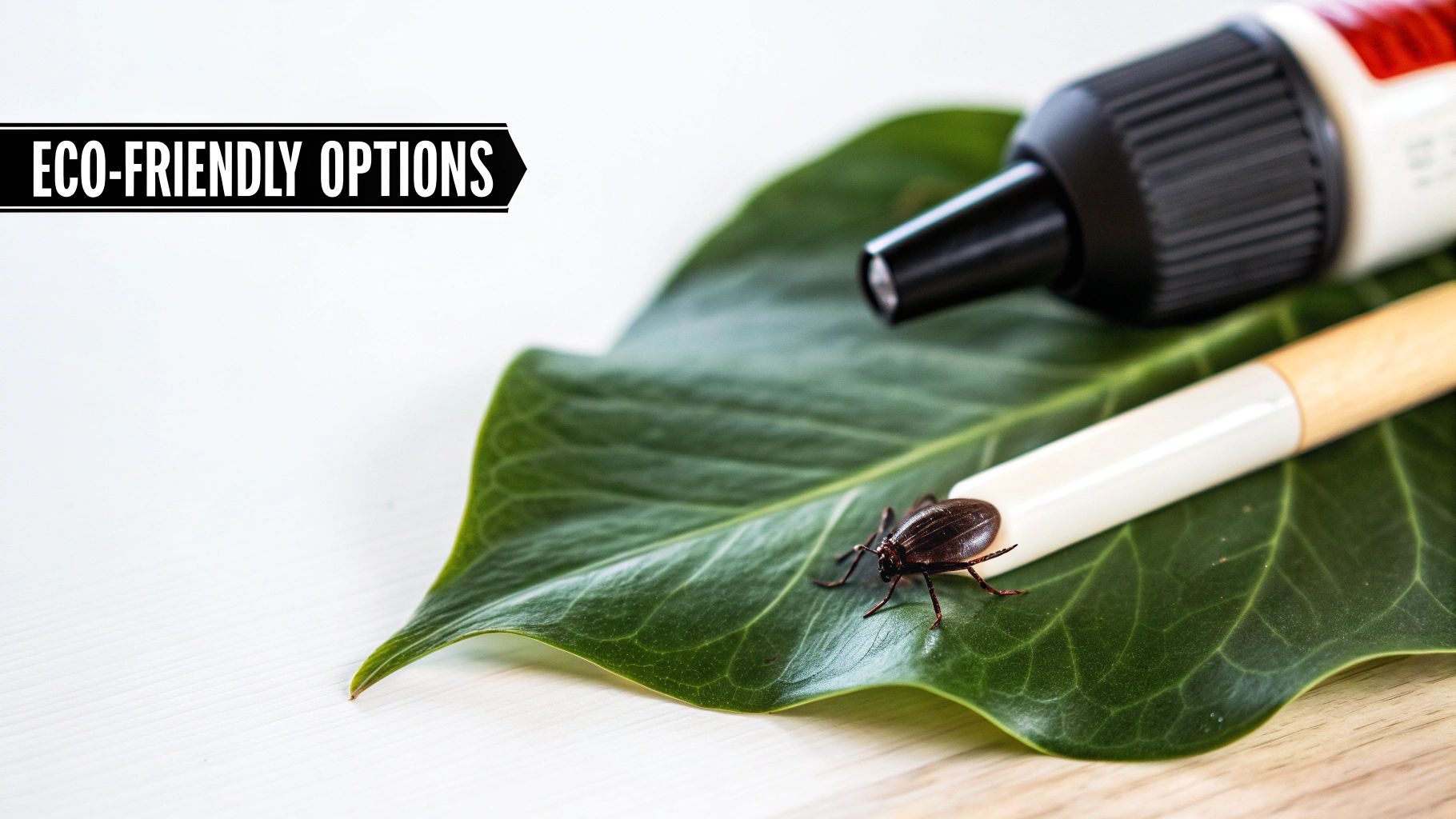
Finding the right pest control company can feel overwhelming, especially when you’re already stressed out by an infestation. You just want the problem gone, fast. But it’s about more than just hiring an exterminator; it’s an investment in the health of your property and the safety of your family.
Taking a moment to check a few things before you hire someone is the best way to steer clear of rogue traders and make sure you’re getting a true professional. A little due diligence now can save you a world of headaches later on.
Verify Their Credentials and Experience
Before you even pick up the phone, do a quick background check. A credible company will be upfront about its qualifications. Here in the UK, a key sign of a quality service is membership in a professional body like the British Pest Control Association (BPCA). This tells you the company follows a strict code of practice and is properly trained and insured.
Experience is also a massive factor, especially with tricky pests. A company that has been dealing with local pest problems for years will have a far better grasp of the specific challenges in your area. Check their website for case studies or just ask them directly about their experience with your particular pest.
Key Questions to Ask During the Consultation
Think of the initial consultation as your chance to interview the company. A pro will be happy to answer your questions and will always carry out a proper inspection before even thinking about a solution.
Here are some essential questions you should be asking:
- What's your proposed treatment plan? They should be able to walk you through exactly what they plan to do, why it’s the best approach, and what products they intend to use.
- Are the treatments safe for my children and pets? A responsible provider will explain their safety measures, including the products used and any precautions you might need to take.
- What guarantees do you offer? You need to know what happens if the pests come back. Do they offer free follow-up visits? A solid guarantee shows they stand behind their work.
Expert Tip: Be very wary of any company that gives you a fixed price over the phone without an inspection. Every pest situation is different, and a one-price-fits-all quote usually means you're getting a one-size-fits-all (and probably ineffective) treatment.
Understand the Treatment Plan and Guarantee
When you get a quote, it should come with a detailed treatment plan. This document is your roadmap to a pest-free home. It needs to clearly state the pest that’s been identified, the areas being treated, the methods they’ll use, and how many visits they expect it will take.
For instance, a plan to tackle an ant problem might involve sealing entry points in the kitchen and using specific gel baits. You can learn more about how the pros deal with these invaders by reading our guide on what to do when you find ants in your home.
Finally, to help you feel confident in your choice, we’ve put together this simple table. Use it as a checklist when you’re comparing companies.
Comparing Pest Control Provider Credentials
| Evaluation Criteria | What to Look For | Why It Matters |
|---|---|---|
| Industry Accreditations | Membership in bodies like the BPCA or NPTA. | Shows commitment to professional standards, training, and ethics. |
| Insurance | Proof of public liability insurance. | Protects you and your property in case of accidents or damage. |
| Local Experience | A track record of dealing with pests in your area. | Local knowledge helps in diagnosing and treating common regional issues. |
| Specialist Expertise | Experience with your specific pest problem. | Not all pests are the same; you need someone who knows the right approach. |
| Reviews & Testimonials | Positive feedback from previous customers. | Real-world feedback gives you an idea of their reliability and service quality. |
| Guarantees | A clear, written guarantee for their work. | A sign of confidence and ensures you have recourse if pests return. |
Always read the service guarantee carefully. A reputable pest control service will always back up their work. This guarantee not only protects your investment but also gives you the peace of mind that the problem will be solved for good, not just for a week or two. Choosing the right partner empowers you to reclaim your home with confidence.
Here is the rewritten section, crafted to sound like an experienced human expert while adhering to all the specified requirements.
Understanding Pest Control Costs in the UK
Let’s talk money. It’s a crucial part of hiring any professional, and pest control is no different. The price you're quoted for a pest control service isn't just a number pulled out of a hat; it’s a careful calculation based on the expertise, tools, and strategy needed to fix your specific problem—properly and safely.
Think of it like getting your car fixed. A simple MOT has a standard price, but if you hear a knocking sound in the engine, a mechanic needs to do a full diagnostic to figure out the cause and what parts are needed. Pest control works the same way. A one-off wasp nest removal is a fairly straightforward job, but it’s priced very differently to a comprehensive, multi-visit contract for tackling a rat problem in a large warehouse.
Key Factors That Influence Pricing
Several things come together to determine the final quote. Understanding them helps you see the value behind the price tag and know what to expect.
- Type of Pest: Different pests need completely different game plans. Getting rid of a bed bug infestation, for example, often involves specialist heat treatments and several visits, making it far more labour-intensive and costly than treating a simple ant problem.
- Size of Your Property: It stands to reason that a larger area, whether it's a four-bedroom house or a sprawling commercial unit, takes more time to inspect and treat. It also means we'll need more materials, like bait or insecticide.
- Severity of the Infestation: A small, localised issue you’ve spotted early is much easier and cheaper to sort out. An infestation that’s been festering for months and has spread throughout the property will demand a much more intensive—and therefore more expensive—plan of attack.
- Number of Visits Required: Some pests can be dealt with in a single visit. But others, especially stubborn ones like rodents and cockroaches, need follow-up appointments to check on activity, refresh bait, and make sure we’ve broken the entire breeding cycle.
The True Cost of Inaction
It’s easy to look at a quote and hesitate, but it’s vital to weigh it against the potential cost of doing nothing. Pests aren’t just a nuisance; they can cause serious structural damage and pose very real health risks.
Consider this: A rat infestation can lead to chewed electrical wires, creating a genuine fire hazard. Cockroaches can contaminate food and spread nasty diseases. The cost of repairing that kind of damage or dealing with health issues almost always dwarfs the expense of professional treatment.
There’s a reason the demand for these services is growing. The UK pest control service market is on track to hit a revenue of about USD 607.7 million by 2027. This is being driven by things like modern waste disposal issues and warmer weather, which creates ideal breeding conditions for pests—insects, in particular, made up nearly 40% of the market back in 2019. You can discover more insights about the UK pest control market to get the full picture.
Ultimately, investing in professional pest control is an investment in your property's safety and your own peace of mind. When you look at the bigger picture, it’s almost always the most cost-effective choice.
Frequently Asked Questions About Pest Control
Even after deciding you need a professional, it’s completely normal to have a few questions. Making a choice about your family’s health and the safety of your home is a big deal, so let's tackle some of the most common queries we get from homeowners every day.
Getting clear, straightforward answers is the best way to feel confident about bringing a pest controller into your home.
Is Professional Pest Control Safe for My Kids and Pets?
Absolutely. For any reputable pest control expert, safety isn't just a feature—it's the absolute top priority. Modern pest control services have thankfully moved on from the old days of just spraying harsh chemicals everywhere.
Today, the entire approach is about precision and care. A true professional will always:
- Use targeted methods: Instead of broad spraying, they’ll use clever solutions like gel baits applied deep inside cracks where little hands can't reach, or secure, tamper-proof bait stations for rodents that kids and pets simply can’t get into.
- Select the right products: Professionals use licensed, regulated products that are rigorously tested for indoor use. Many are designed to do their job effectively and then break down quickly, leaving no lasting residue.
- Provide clear instructions: If any precautions are needed—like keeping a dog out of a treated room for a short while—they’ll give you simple, easy-to-follow guidance. There’s no guesswork involved.
Can't I Just Do It Myself?
The urge to grab a can of spray from the supermarket and sort it yourself is strong, especially when you think it might save you a few quid. While these DIY products might knock down the few pests you can see, they almost never get to the root of the problem.
Think of it this way: squashing a couple of ants on your kitchen counter does nothing to the thousands still marching around in the nest hidden in your wall cavity. A professional has the training and equipment to trace the problem back to its source and eliminate it completely, giving you a lasting solution, not just a temporary fix.
Key Difference: Professional services almost always come with a guarantee. If the pests pop up again within a specific time, the company will return to sort it out at no extra cost. That's a level of accountability you just won't get from a DIY can.
How Do I Stop Pests From Coming Back?
Getting rid of the current infestation is really only half the job. The real win is making sure they don’t come back. A good pest control professional won't just treat the issue and leave; they'll partner with you, offering practical advice to help you pest-proof your home for good.
This isn't complicated stuff, either. It usually comes down to simple but effective housekeeping and maintenance tips:
- Sealing up gaps around pipes and along skirting boards.
- Keeping food stored away in airtight containers.
- Making sure your bins have lids that seal tightly.
- Fixing any leaky taps and sorting out damp spots.
By taking these small steps, you make your home a much less inviting place for pests, breaking the cycle of infestation and giving you long-term peace of mind.
Ready to reclaim your home from unwanted guests with a safe, effective, and professional approach? For a lasting solution that protects your family and property, trust the experts at Pest Predators Limited. Book your consultation today and feel the difference professional care makes.
Article created using Outrank
